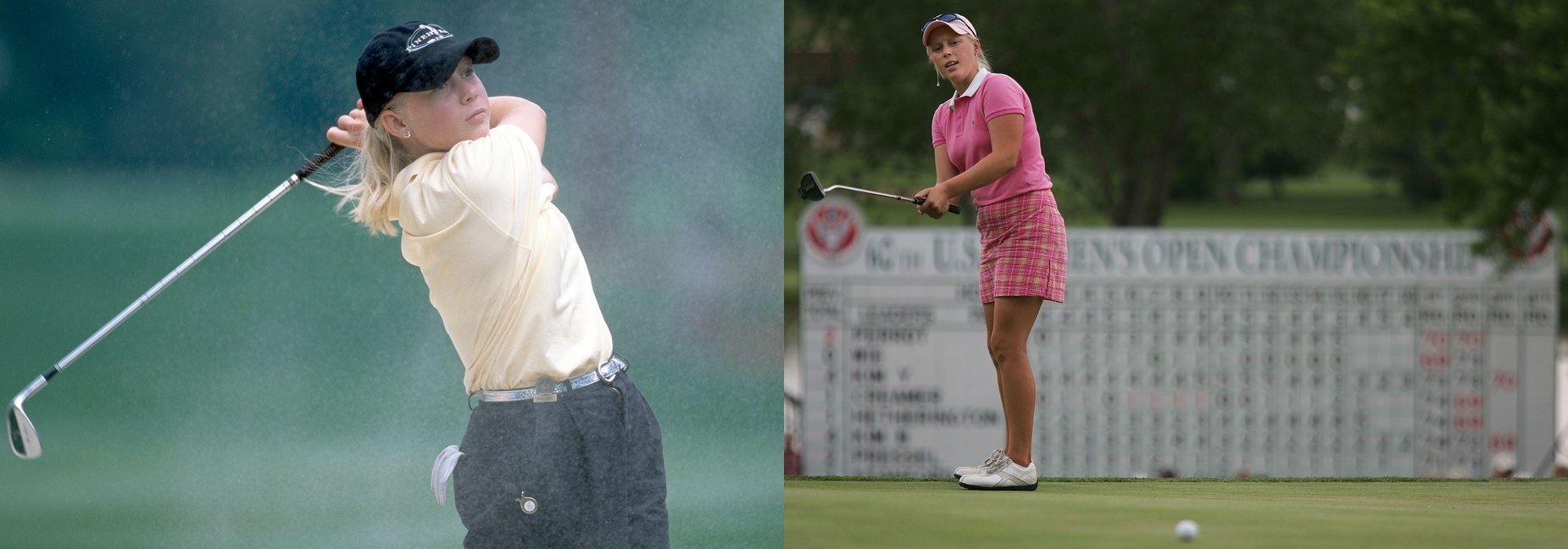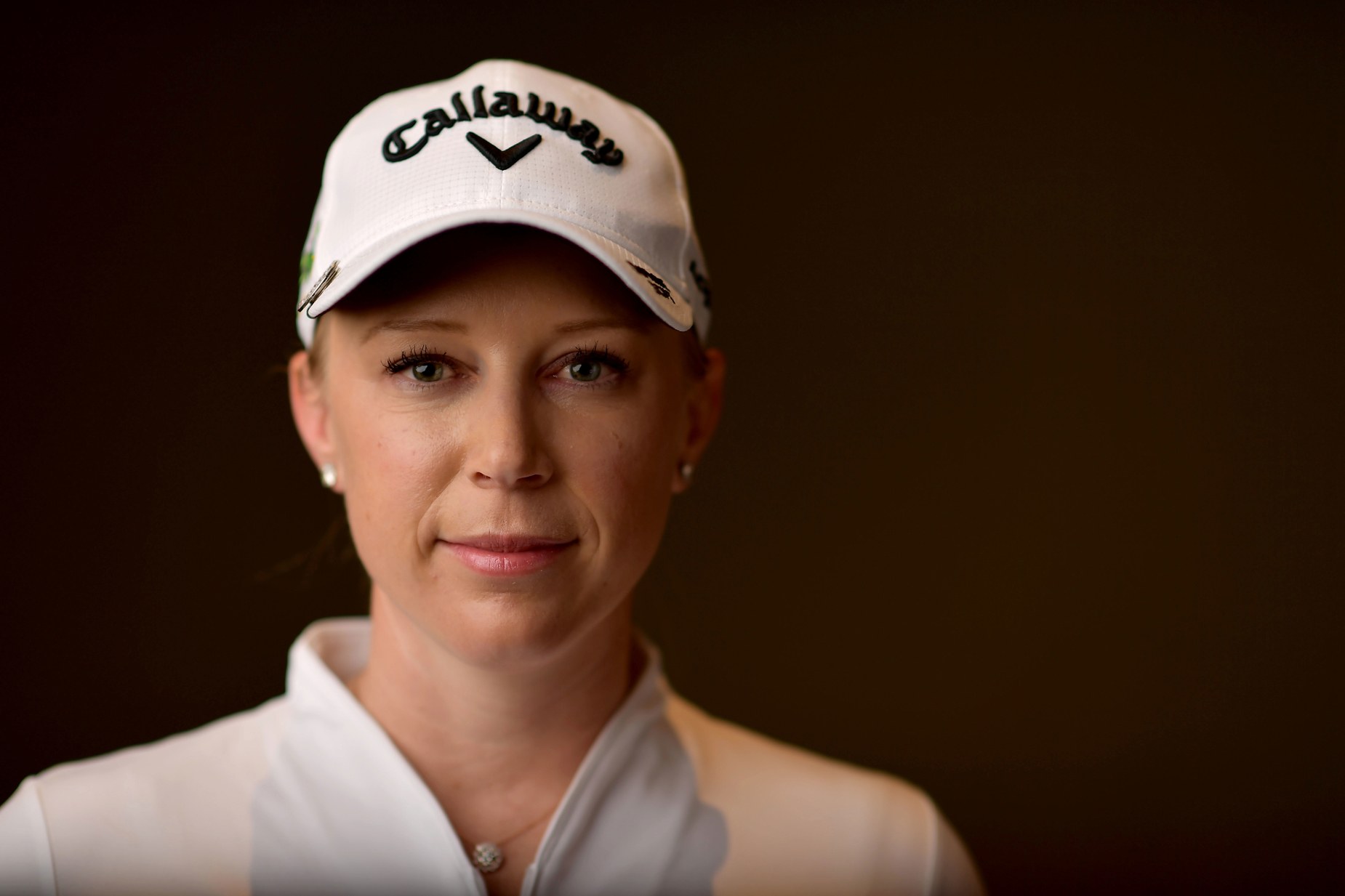By Keely Levins
It was 2001, and a very (very) young Morgan Pressel was about to do something that would change her life. “When I was 12, I remember asking my grandfather ‘What tournament is this?’ And him saying, ‘It’s a qualifier for the U.S. Open.’ And I asked him, ‘Why am I playing in that?’ He said for experience.”
It ended up being a bigger experience than they could have planned for. The middle schooler living in Boca Raton, Fla., made history by qualifying for the Women’s Open at Pine Needles, becoming at the time the youngest to ever qualify for the women’s national championship.
She missed the cut in 2001, but four years later, at the Women’s Open at Cherry Hills outside Denver, Pressel nearly won the title as an amateur. Birdie Kim, true to her name, holed out for birdie on the 72nd hole, as Pressel played in the group behind. Pressel made bogey at 18, leaving her and Brittany Lang, also an amateur at the time, in a tie for second.
For the next 12 seasons, save for one withdrawal in 2012, Pressel competed in the biggest women’s event in golf, posting two more top-10 finishes. She was such a regular in the championship, making it easy to overlook just how big an accomplishment qualifying actually is.
She’s back again once more this week at the Country Club of Charleston, teeing it up with Gerina Piller and Paula Creamer off the first tee on Thursday afternoon. But only after the humbling experience of having to go back to doing what she first had to do as 12-year-old: qualify for the Women’s Open via sectional qualifying.
This was actually Pressel’s second straight year that she was forced to play in sectional qualifying. A year ago, Pressel was three spots shy an automatic exemption off the LPGA money list.
“It was tough to even go to Sectional Qualifying,” Pressel admitted. “I probably even had the attitude that I didn’t want to go. I was just frustrated that I had to be there.”

Pressel first qualified for the 2001 Women’s Open as a 12-year-old (left) and finished T-2 as an amateur in 2005 at Cherry Hills.
Suffice it to say, that experience wasn’t a positive one. The Virginia location where Pressel tried to qualify had a stacked field, because it was right before the LPGA event in Virginia, the Kingsmill Championship. There were four available spots, and Pressel didn’t make it.
“I was sad, really disappointed,” she said. “I didn’t even really watch any of it. I couldn’t bring myself to watch it. I was disappointed that I wasn’t there.”
Failing to qualify for the U.S. Women’s Open as a 29-year-old is harder in some ways than missing out as a teen, because it comes with knowing that qualifying is something she’s very capable of. But it’s easier in that a 29-year-old has had the experience to know a career doesn’t end with a single missed opportunity, a collection of bad holes. When she played in sectional qualifying again this year in California, not only qualified but was medalist by three shots.
Her former self might not be able to get herself there.
“I learned that life goes on. It was a blip. The last couple of years have been a blip I feel like I could say,” Pressel said. “I’m happy to not be sitting this one out.”
• • •
There are few people as young as Pressel (she turned 31 last week) who have had such a long career. It gives her a unique, and powerful, perspective on what motivates a golfer, what thoughts work at certain times, what becomes complicated, and how to make things simple again. When she talks about what made her play in that first U.S. Women’s Open, it’s the simple realization kids have all the time: That they love something and want to do it for as long as possible.
“I remember when I first played in the Open, I’d only been playing golf for a little over four years,” Pressel said. “I had decided that this is awesome, this is what I want to do with my life. It was that lightbulb for me.”
After winning the 2005 U.S. Women’s Amateur, Pressel skipped college golf and turned pro at age 17. Shortly thereafter, she became the youngest player to win a major, taking the 2007 Kraft Nabisco Championship title at age 17. She’d win again a year later in Hawaii, in what surprisingly turned out to be her second and so far her last LPGA Tour victory.
As the years pass, motivation can get complicated. Especially when you add difficult seasons to the equation. In March 2019, Pressel was ranked No. 191 in the world. It’s a long way down from having been in the top 20 in 2015, 2012, 2011 and 2010.
“Over the last couple years, I’ve had a lot of moments of questioning. Am I doing the right thing? Is golf what I should be doing? I’ve had lots of different thoughts going through my head,” Pressel said. “I don’t think I’ve seriously thought about stopping golf. But sometimes that self doubt in the back of your mind, it’s powerful. Sometimes it doesn’t have anything to do with beating your opponent; it has to do with conquering your own mind.”
The motivation she maintained was something she said a recent PGA Tour winner phrased well. Pressel read about Max Homa’s breakthrough win at the Wells Fargo Championship and read that throughout his struggle, he kept falling back to the notion that Today’s the day. It was a phrase that resonated with Pressel.
“When you stop having that feeling of Today’s the day, that’s when probably it’s time to move on to something else,” she said. “I know that I’m capable of playing better golf than I’ve been playing. I think that’s what’s been pushing me forward.”

Donald Miralle/Getty Images
Pressel posing for an LPGA portrait in March.
That’s a harder mentality to maintain than the simplicity of young passion, but Pressel has done just that. She worked through a wrist injury, saying she developed some bad swing habits in the process. Then she tried to fix her swing on her own, an idea that seemed like the right call at the time. But after about two years she called Martin Hall, the instructor who worked with her when she was young. For mechanics, they’re working on getting the club back on plane. Mentally, the focus has been more on patience and alleviating the frustration that she’s been feeling on the course.
“It’s been 14 years on tour, and I’ve been through a little bit of everything. Ups, down, everything in the middle,” Pressel said. “Nothing lasts forever. The good times don’t last forever, the tough times don’t last forever. And if you let golf really beat you up, you’re pretty much done. I feel like I’m better at not letting golf beat me up off the course, separating my job from who I am as a person. Sometimes, when everybody knows you as a golfer, and people see your results and see your struggles, sometimes it’s hard to separate the two—life and golf. That’s where a really strong support team comes in. I’m really lucky to have that.”
Pressel got everyone’s attention the way young, prodigal players do. The sense of awe, and even confusion, at a young person achieving incredible athletic feats will always inspire a following. But the navigation of the nonlinear trajectory of progress over the course of a full, complicated, imperfect career makes Pressel as interesting during this U.S. Women’s Open as she was in her first.
“My expectations are higher now than when I was a young amateur,” said Pressel. “I’ve always been a big dreamer, goal setter, envision yourself where you want to them, and then take the steps necessary to get there.”









